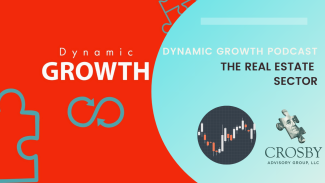
The Real Estate Sector
Spotlight #4: The Real Estate Sector
For those of you that have joined us on our podcast sector spotlight tour, you’ll recognize some themes are forming and real estate is no different. Did someone say diversify? After all, thus far in 2022 roughly 80% of businesses are still reporting they are meeting or surpassing earnings. Add in interest rates, inflation, job vacancies and enter volatility stage left. Our strategy is to hang on to what we have invested in and as dividends are paid, we spread the risk into varying types of asset classes. Diversification anyone?!
What is included in the real estate sector?
If you’re anything like me, you think it’s fairly straight forward: real estate = land, buildings, property. I must admit that I got a bit tripped up when Nate and Derek started talking about cell phone and data center companies – why aren’t they in the communications sector? So, for anyone with that same question, the main thing the real estate sector cares about is owning the land, raising money to buy more land/properties/cell towers, and qualifying as a REIT (more to come on this!) – the industry doesn’t really matter.
The Numbers
Sector weights (S&P 500)
- Utilities – 2.4%
- Consumer staples – 5.6%
- Communications – 10.8%
- Real Estate – 2.6%
We looked at both Spider and Vanguard for this sector – so that’s XLRE & VNQ respectively. Here are the highlights:
-
Concentration – XLRE 29 holdings / VNQ 168 holdings
-
Yields are almost the same – XLRE 2.86% / VNQ 2.79%
-
Turn-over ratio are both low – XLRE 4% / VNQ 8%
- What’s turn-over ratio? How much the portfolio is bought/sold/replaced
-
Max draw down –XLRE lost 20% / VNQ lost 25%
- What’s max draw down? The peak to trough market change
-
Average overall performance from 2016-present – XLRE 10.8% / VNQ 9.04%
What does that mean? The VNQ ETF is more concentrated and less diversified.
Real Estate Investment Trusts (REIT) Tax & Types
A REIT is a company that owns income-producing real estate. REITs own many types of commercial real estate, including office and apartment buildings, warehouses, hospitals, shopping centers, and more. To qualify as a REIT, you have to pay 90% of earnings to investors. and for doing that you get tax benefits.
One of the investment benefits in REITs is gaining exposure to physical real estate without having to take on the actual work of owning & maintaining something. Fun fact: Nate’s personal investment strategy includes about 30% REITs.
However, the tax side of owning a REIT is something to be aware of before you invest. For tax sensitive investors, you may want to own REITs inside an IRA or 401K – why? When you hold outside an IRA, if the manager is churning it (high turn-over ratio – see definition above) that will be passed on to you in the form of a capital gain (or loss). You may not have sold the fund but the manager did and it will be passed on to you at tax time.
Types of REITs:
- Retail – malls, retail stores, physical goods at a physical store, land/building rent
- Residential – apartment buildings, real estate development housing
- Healthcare – hospitals, medical centers, nursing facilities, retirement homes
- Office – office buildings
- Mortgage – these don’t own physical real estate but they buy the debt/mortgages
Pro tip: do your research on regions (cities), local economies, interest rates, etc. before choosing the REIT that’s best for your portfolio.
Valuations for REITs
Three things to focus on when evaluating a REIT:
- Price to funds from operation (not the PE ratio)
- Payout ratios – how much of the price to funds from operation is being allocated to pay the dividend (hint: for a REIT it should be over 90%)
- Healthy balance sheet
CAG Watch List
We’ve added Vanguard VNQI – international real estate fund – to our model. Here are few others we’ll be keeping an eye on:
- Cell towers: Crown Castle (CCI), American Tower (AMT), SBA Communications (SBAC)
- Data center storage: Prologis (PLD), Equinix (EQIX)
- Healthcare: Welltower (WELL)
Resources we like:
In Summary & CAG Marketing
We hope the theme of diversification is coming through loud and clear! In 2022, there will be volatility – be diverse in the businesses you own, the sectors, and the geographies.
We’ve been talking lately about our new emphasis on marketing and business strategy development. This week we hosted Carly on a special podcast episode dedicated to introducing her to all of you and started to talk about branding. You can listen to the full episode on Spotify.
Please note: This content is not a direct recommendation for investment. Investing involves risk including the potential loss of principal. Not all investments are suitable for all people. Crosby Advisory Group, LLC is a registered investment advisor in Ohio, Florida, and Texas.

